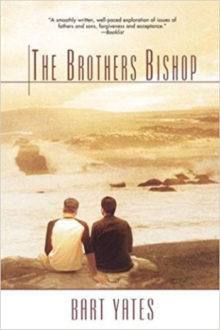 The Brothers Bishop
The Brothers Bishop
by Bart Yates
Published by Kensington
Published July 1, 2005
Fiction (youth)
304 pgs. • Find on Amazon.com
Reviewed by Stephen O. Murray
June 29, 2007.
As with Bart Yates’s first novel, Leave Myself Behind, what I like best about his second one, The Brothers Bishop (2005), is the voice of the narrator.
It is not the same one as the earlier one (which was that of a gay youth). Nathan Bishop is 31. Many, including his flamboyant younger brother Tommy, think that Nathan is closed-down, a 30-something wizened sexagenarian who has given up on Love and Life (insofar as Tommy can imagine these being two things…). Nathan comes across, however, as being fairly content to live in the coastal Connecticut house where the two were raised (by a quite nasty piece of work father) close to the beach, and to try to teach dolts (remedial English the summer in which the novel is set).
Early on, the flintily self-reliant Nathan notes: “I’ve been told on more than one occasion that I should stop reading so much and actually have a life, but do you know what I’ve figured out? People in books are much more interesting than the people who’ve told me that.”
Tommy strives on attention and Duh-Rama; Nathan wants to be left alone to read and watch the waves break. Nathan feels he had more than enough melodrama surviving his childhood and adolescence with an ornery father who was, among other things, intensely homophobic.
An archaeologist wants to invade Nathan’s nearly monastic and solitary sanctuary. He has no interest in excavating a distant (or even a not-so distant) past or in disruption. The would-be dig pales in contrast to hurricane Tommy, who drops in with practically no notice with his latest amour, Philip, and a married couple, Camille and Kyle. Nathan knows that Tommy grows bored of those who love him and will dump Philip, who will be hurt. It is also immediately obvious to Nathan that Kyle is in love with Tommy and that Camille is very close to being conscious that the man she has married is more attracted to men (not just Tommy) than to her. As if these messes that Nathan foresees aren’t enough, there is his student Simon, who is being beaten by his father (a DA) and whom Tommy cannot help seducing.
The tense relationships (not least that between Simon and his father whose violence echoes that of the Bishop père) blow up to extents even beyond Nathan’s forebodings…and he has to consider leaving his cocoon and beloved shoreline.
The plot is deftly unfolded, the characters nuanced (this is most surprisingly the case for Philip and Simon, more expectedly the case with Camille and with others’ perspective on their father before and after their mother’s death), and there is a lot of comedy (not least involving the archaeologists and their local patroness, Cheri). But as I began by saying, it is the narrative voice of Nathan that makes the book outstanding. It’s also often very funny (and not just Nathan’s dry, analytical wit), though I think there is too much melodrama. Moreover, the book sags a bit in the middle and seems to me to try to confront too many issues for one book. And, perhaps, I am uncomfortable with the amount of rage beneath Nathan’s placid surface—and his resemblances with the destructive rage that twisted his father’s life?
Postscripts: Legal Verisimilitude and Invidious Comparisons
Yates made Simon a few weeks short of 15. The age of consent in Connecticut is 16, so the sexual contact of Tommy with Simon was a class D felony under Sec. 53a-73a of the Connecticut Penal Code. In the book, Tommy is facing an automatic ten-year prison sentence, but according to the Connecticut penal code, punishment is one to five years (which I don’t doubt would still seem forever to Tommy). The relationship (here and elsewhere) has been referred to as pedophilia, which for me is restricted to sexual contact between an adult and a prepubescent. This is not to say that Simon was psychologically ready for a sexual involvement with Tommy, however eager and physically ready he was. Having sex with someone legally a minor who is also the son of a district attorney is very rash, quite apart from whether the father is physically abusing the son.
Second, I think that Yates is a peer of the masters of the Lavender Quill who are still punishing themselves and/or their gay characters; Yates has none of their maudlin self-pity. I haven’t read Edmund White’s just-published novella, but the title Chaos suggests more self-pity (following on My Lives. I’m not sure that Andrew Holleran’s novella Grief wallows, but The Beauty of Men certainly did).
As gay pride month comes to end (with a final flurry of postings from me!), I’ve been admiring those who do not feel sorry for themselves and forever display their wounds (/claims to victimhood). I know very well that those who have been mistreated often mistreat others (and Nathan has caused real harm in the past), but we all can find some rationalization for being fucked up. As Jay Quinn wrote in The Mentor:
Name one person who claims to have enjoyed a totally carefree, prosaic childhood and I’ll show you a politician or a marketing executive. The reality of childhood and adolescence is never as sanitized or innocent as the images ad men create or politicians presume to defend. Reality won’t sell toilet bowl cleaner or tract houses. Politicians building a platform on family values won’t be elected by voters who are busily breeding little consumers if they treat the messy, frustrating experience of childhood in anything other than idealized terms.
Yates has subsequently published three more novels (one under a pseudonym) in which there may be gay characters, but they are not (as) central. See his website bartyates.com.
first appeared on epinions, 29 June 2007
©2007, 2017, Stephen O. Murray

